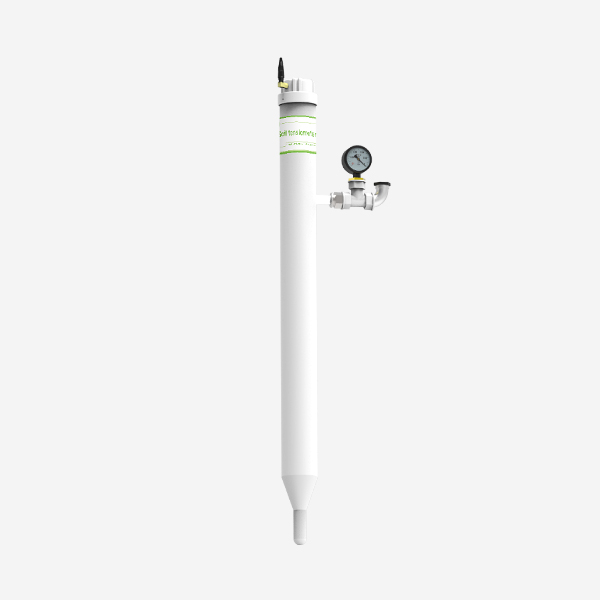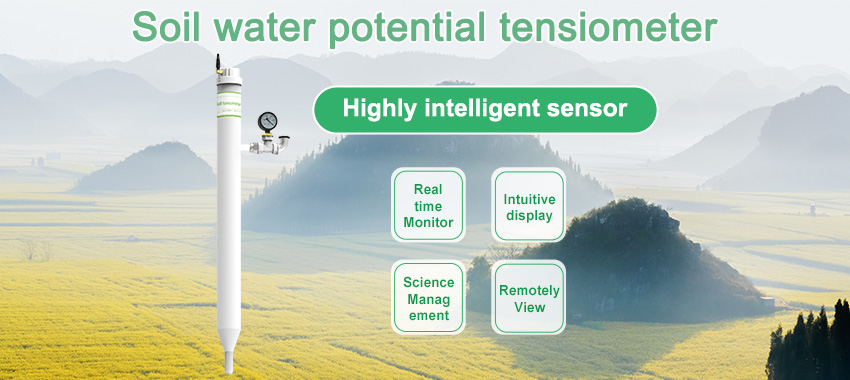Introduction:
Soil water potential plays a crucial role in determining the movement and availability of water in the soil-plant-atmosphere continuum. It is a measure of the energy status of water in the soil, which affects its movement and availability to plants. Tensiometers are widely used instruments to measure soil water potential, providing valuable insights into soil moisture dynamics. This article aims to explore the role of tensiometers in understanding soil water potential and its implications for plant growth and water management.

Soil Water Potential:
Soil water potential is a measure of the energy status of water in the soil. It is influenced by factors such as soil texture, structure, organic matter content, and temperature. Soil water potential is expressed in units of pressure, typically kilopascals (kPa). It is a negative value, with more negative values indicating drier conditions. The concept of soil water potential helps us understand the movement of water in the soil and its availability to plants.
Tensiometers:
Tensiometers are instruments used to measure soil water potential. They consist of a porous ceramic cup connected to a water-filled tube. When inserted into the soil, water moves out of the ceramic cup due to the soil’s suction or tension. This tension is transmitted to the water-filled tube, which can be measured using a pressure gauge. The measurement obtained is the soil water potential in the vicinity of the tensiometer.
Working Principle of Tensiometers:
Tensiometers work based on the principle of capillary action. The porous ceramic cup acts as a wick, allowing water to move from the cup to the drier soil surrounding it. This movement of water is driven by the tension or suction in the soil. The tension is a result of the attraction between water molecules and soil particles. By measuring the tension in the water-filled tube, we can indirectly determine the soil water potential.
Applications of Tensiometers:
Tensiometers have various applications in agriculture, horticulture, and soil science. They are commonly used to monitor soil moisture levels and irrigation needs. By measuring soil water potential, tensiometers provide real-time information about the water status of the soil. This information helps in optimizing irrigation scheduling, preventing over-irrigation or under-irrigation, and conserving water resources. Tensiometers are also used in research studies to investigate soil moisture dynamics, plant-water relationships, and the effects of different management practices on soil water potential.
Advantages of Tensiometers:
Tensiometers offer several advantages over other methods of measuring soil water potential. Firstly, they provide a direct measurement of soil water potential in the field, allowing real-time monitoring. Other methods, such as pressure plates or gypsum blocks, require soil sampling and laboratory analysis, which can be time-consuming and impractical for continuous monitoring. Secondly, tensiometers are relatively inexpensive and easy to install. They can be used in various soil types and depths, providing flexibility in monitoring different soil profiles. Lastly, tensiometers have a long lifespan and require minimal maintenance, making them a cost-effective choice for long-term soil moisture monitoring.

Limitations of Tensiometers:
Despite their advantages, tensiometers have some limitations that need to be considered. Firstly, they can only measure soil water potential in the saturated range, typically up to -85 kPa. Beyond this range, the tension becomes too high, and air enters the ceramic cup, affecting the measurement accuracy. Secondly, tensiometers require regular calibration to ensure accurate readings. The ceramic cup can get clogged with soil particles or roots, affecting the water movement and measurement. Regular maintenance, such as cleaning and recalibration, is necessary to obtain reliable data. Lastly, tensiometers provide point measurements and may not represent the entire root zone. Multiple tensiometers may be needed to capture spatial variability in soil water potential.
Conclusion:
Understanding soil water potential is crucial for efficient water management and optimizing plant growth. Tensiometers play a vital role in measuring soil water potential, providing real-time information on soil moisture dynamics. They offer advantages such as direct field measurement, ease of installation, and cost-effectiveness. However, they have limitations regarding measurement range, calibration, and representativeness. Despite these limitations, tensiometers remain valuable tools in understanding soil water potential and enhancing water management practices.